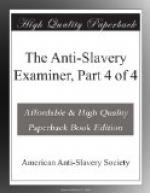“RESOLVED, That we view with abhorrence the attempt of the Abolitionists to establish in this town a school for the instruction of the sable sons and daughters of Africa, in common with our sons and daughters.
“RESOLVED, That we will not associate with, nor in any way countenance, any man or woman who shall hereafter persist in attempting to establish a school in this town for the exclusive education of blacks, or for their education in conjunction with the whites.”
The frankness of this last resolve is commendable. The inhabitants of Canaan, assembled in legal town meeting, determined, it seems, that the blacks among them should in future have no education whatever—they should not be instructed in company with the whites, neither should they have schools exclusively for themselves.
The proprietors of the academy supposing, in the simplicity of their hearts, that in a free country they might use their property in any manner not forbidden by law, proceeded to open their school, and in the ensuing spring had twenty-eight white, and fourteen colored scholars. The crisis had now arrived when the cause of prejudice demanded the sacrifice of constitutional liberty and of private property. Another town meeting was convoked, at which, without a shadow of authority, and in utter contempt of law and decency, it was ordered, that the academy should be forcibly removed, and a committee was appointed to execute the abominable mandate. Due preparations were made for the occasion, and on the 10th of August, three hundred men, with about 200 oxen, assembled at the place, and taking the edifice from off its foundation, dragged it to a distance, and left it a ruin. No one of the actors in this high-handed outrage was ever brought before a court of justice to answer for this criminal and riotous destruction of the property of others.
The transaction we have narrated, expresses in emphatic terms the deep and settled hostility felt in the free States to the education of the blacks. The prejudices of the community render that hostility generally effective without the aid of legal enactments. Indeed, some remaining regard to decency and the opinion of the world, has restrained the Legislatures of the free States, with one exception, from consigning these unhappy people to ignorance by “decreeing unrighteous decrees,” and “framing mischief by a law.” Our readers, no doubt, feel that the exception must of course be OHIO.
We have seen with what deference Ohio legislators profess to regard their constitutional obligations; and we are now to contemplate another instance of their shameless violation of them. The Constitution which these men have sworn to obey declares, “NO LAW SHALL BE PASSED to prevent the poor of the several townships and counties in this State from an equal participation in the schools, academies, colleges, and universities in this State, which are endowed in whole, or in part, from the revenue arising from donations made by the United States, for the support of colleges and schools—and the door of said schools, academies, and universities shall be open for the reception of scholars, students, and teachers of every grade, without ANY DISTINCTION OR PREFERENCE WHATEVER.”




